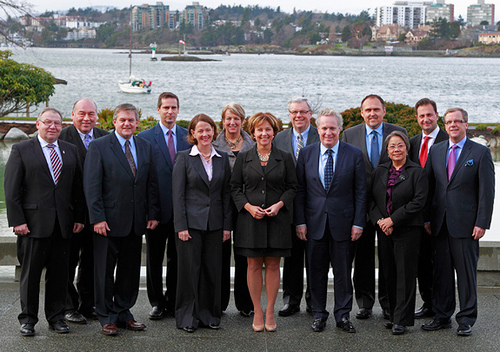Back in the olden days, when prime ministers still deigned to speak to provincial premiers, they would hold gatherings called First Ministers’ conferences. This happened fairly often, perhaps once a year, depending on what was happening in the country at the time.
The prime minister would invite his provincial counterparts to Ottawa to talk about the economy, the Constitution, the state of the federation, pensions, medicare or even that old chestnut, the reform of the Senate. The premier of Ontario always sat on the PM’s right, the premier of Quebec on his left, with the others placed around the table in the order of entry into Confederation.
If he was in a good mood, which he often was, their genial host would invite his guests home for drinks and dinner. They might pose for a group photograph, then hold press conferences to tell the Canadian public what they had discussed and decided, or left undecided.
Thinking back on it, it was a comforting ritual. Things might be going badly in the land — whether because of international issues, persistent unemployment, hyper-inflation or the threat of separatism — but at least the leaders, regardless of partisan affiliation, would gather to try to sort out problems and seek solutions. The process was reassuringly Canadian.
That was then. This is now. In the Sun King era in Ottawa, Stephen Harper does not hold federal-provincial conferences. Now that he has a majority government, he doesn’t think he needs to.
It’s not so much that he actively dislikes individual premiers (although he manages to control his affection for Ontario’s Kathleen Wynne), as it is that he actively resists the notion of meeting with them en masse. That would mean sharing the big national stage with a gaggle of mere provincial politicians, who would undoubtedly try to make him spend his money to fix their problems. He has cabinet ministers who can take care of whatever it may be that is troubling these lesser leaders. And why should he have them home for dinner?
The premiers think of themselves as partners in Confederation. He treats them as uninvited guests at the national table.
The chill between Ottawa and Toronto is deepening. Premier Wynne wants to meet Harper to discuss such legitimate issues as infrastructure, the auto industry, improvements to the Canada Pension Plan, and violence against Aboriginal women and girls. She wrote to Harper in September to request a meeting. Last week, two months later, she got a reply but no agreement to meet. “I encourage you to work with the responsible federal ministers to make further progress in these priority areas over the coming year,” the prime minister wrote.
Why the snub? It has everything to do with partisan politics. In the past — though not always, admittedly — federal and provincial leaders tried to keep out of each other’s patch in election season. Not today. Wynne is openly campaigning for Justin Trudeau and the federal Liberals in the pre-launch to the federal election of 2015, just as Harper and his people vigorously supported Tim Hudak and the Progressive Conservatives in the Ontario election this year.
The federal election next October will be won or lost in Ontario. In Wynne, the Liberals have a potent ally. She has a fresh majority mandate and is considerably more popular in the province — especially in Toronto — than Harper is. So don’t expect him to do her any favours between now and election day.
The breakdown in relations between Ottawa and Ontario has had one interesting effect. Left without someone to talk to in Ottawa, Wynne is working around Harper by making common cause with Quebec’s new premier, Philippe Couillard, a fellow Liberal, starting with electricity swaps (they signed an agreement when they met in Toronto last week), climate change and pipelines.
For Ontario and Quebec to work together is in the best tradition of Confederation. That they are doing it today highlights the leadership vacuum that exists in Ottawa.
Cambridge resident Geoffrey Stevens, an author and former Ottawa columnist and managing editor of the Globe and Mail, teaches political science at Wilfrid Laurier University and the University of Guelph. His column appears weekly in Waterloo Regional Record and Guelph Mercury. He welcomes comments at [email protected]



